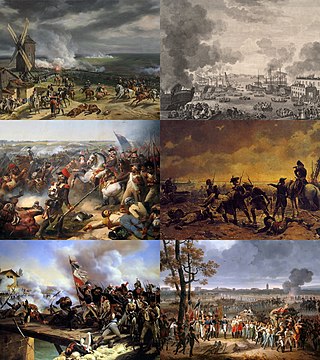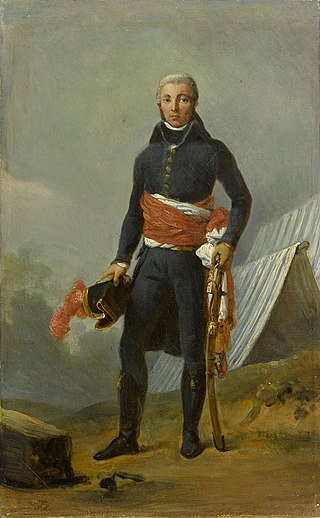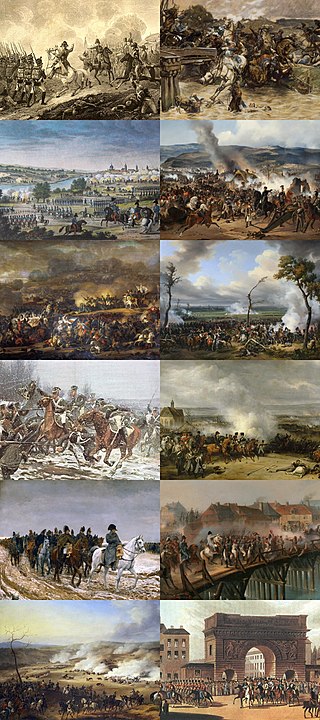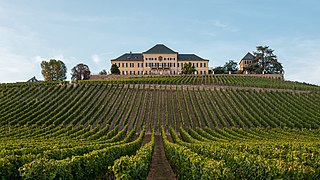Related Research Articles

Archduke Charles Louis John Joseph Laurentius of Austria, Duke of Teschen was an Austrian field-marshal, the third son of Emperor Leopold II and his wife, Maria Luisa of Spain. He was also the younger brother of Francis II, Holy Roman Emperor. He was epileptic, but achieved respect both as a commander and as a reformer of the Austrian army. He was considered one of Napoleon's more formidable opponents and one of the greatest generals of the French Revolutionary and Napoleonic Wars.

Klemens Wenzel Nepomuk Lothar, Prince of Metternich-Winneburg zu Beilstein, known as Klemens von Metternich or Prince Metternich, was a conservative Austrian statesman and diplomat who was at the center of the European balance of power known as the Concert of Europe for three decades as the Austrian Empire's foreign minister from 1809 and chancellor from 1821 until the liberal Revolutions of 1848 forced his resignation.

Riesling is a white grape variety that originated in the Rhine region. Riesling is an aromatic grape variety displaying flowery, almost perfumed, aromas as well as high acidity. It is used to make dry, semi-sweet, sweet, and sparkling white wines. Riesling wines are usually varietally pure and are seldom oaked. As of 2004, Riesling was estimated to be the world's 20th most grown variety at 48,700 hectares, but in terms of importance for quality wines, it is usually included in the "top three" white wine varieties together with Chardonnay and Sauvignon blanc. Riesling is a variety that is highly "terroir-expressive", meaning that the character of Riesling wines is greatly influenced by the wine's place of origin.

The War of the First Coalition was a set of wars that several European powers fought between 1792 and 1797, initially against the constitutional Kingdom of France and then the French Republic that succeeded it. They were only loosely allied and fought without much apparent coordination or agreement; each power had its eye on a different part of France it wanted to appropriate after a French defeat, which never occurred.

François-Étienne-Christophe Kellermann or de Kellermann, 1st Duke of Valmy was a French military commander, later the Général d'Armée, a Marshal of the Empire and freemason. Marshal Kellermann served in varying roles throughout the entirety of two epochal conflicts, the French Revolutionary Wars and the Napoleonic Wars. Kellermann is one of the names inscribed under the Arc de Triomphe, on Column 3.

The Hundred Days, also known as the War of the Seventh Coalition, marked the period between Napoleon's return from eleven months of exile on the island of Elba to Paris on 20 March 1815 and the second restoration of King Louis XVIII on 8 July 1815. This period saw the War of the Seventh Coalition, and includes the Waterloo Campaign and the Neapolitan War as well as several other minor campaigns. The phrase les Cent Jours was first used by the prefect of Paris, Gaspard, comte de Chabrol, in his speech welcoming the king back to Paris on 8 July.

Jean-Baptiste Jourdan, 1st Count Jourdan, was a French military commander who served during the French Revolutionary Wars and the Napoleonic Wars. He was made a Marshal of the Empire by Emperor Napoleon I in 1804. He was also a Jacobin politician during the Directory phase of the French Revolution, serving as member of the Council of Five Hundred between 1797 and 1799.

Maximilian I Joseph was Duke of Zweibrücken from 1795 to 1799, prince-elector of Bavaria from 1799 to 1806, then King of Bavaria from 1806 to 1825. He was a member of the House of Palatinate-Birkenfeld-Zweibrücken, a branch of the House of Wittelsbach.

Jean Victor Marie Moreau was a French general who helped Napoleon Bonaparte rise to power, but later became his chief military and political rival and was banished to the United States. He is among the foremost French generals in military history.

Joachim Murat was a French Army officer and statesman who served during the French Revolutionary and Napoleonic Wars. Under the French Empire he received the military titles of Marshal of the Empire and Admiral of France. He was the first Prince Murat, Grand Duke of Berg from 1806 to 1808, and King of Naples as Joachim-Napoleon from 1808 to 1815.

In the War of the Sixth Coalition, sometimes known in Germany as the Wars of Liberation, a coalition of Austria, Prussia, Russia, Spain, Great Britain, Portugal, Sweden, Sardinia, and a number of German States defeated France and drove Napoleon into exile on Elba. After the disastrous French invasion of Russia of 1812 in which they had been forced to support France, Prussia and Austria joined Russia, the United Kingdom, Sweden, and Portugal, and the rebels in Spain who were already at war with France.

The War of the Fourth Coalition was a war spanning 1806–1807 that saw a multinational coalition fight against Napoleon's French Empire, subsequently being defeated. The main coalition partners were Prussia and Russia with Saxony, Sweden, and Great Britain also contributing. Excluding Prussia, some members of the coalition had previously been fighting France as part of the Third Coalition, and there was no intervening period of general peace. On 9 October 1806, Prussia declared war on France and joined a renewed coalition, fearing the rise in French power after the defeat of Austria and establishment of the French-sponsored Confederation of the Rhine in addition to having learned of French plans to cede Prussian-desired Hanover to Britain in exchange for peace. Prussia and Russia mobilized for a fresh campaign with France, massing troops in Saxony.

Antoine-Charles-Louis, Comte de Lasalle was a French cavalry general during the French Revolutionary and Napoleonic Wars. Often called "The Hussar General," he first gained fame for his role in the Capitulation of Stettin. Throughout his short career, he became known as a daring adventurer and was credited with many exploits, fighting on every front. He was killed at the Battle of Wagram.

Geisenheim is a town in the Rheingau-Taunus-Kreis in the Regierungsbezirk of Darmstadt in Hessen, Germany, and is known as Weinstadt, Schulstadt, Domstadt and Lindenstadt.

Karl Philipp, Fürst zu Schwarzenberg was an Austrian Generalissimo and former Field Marshal. He first entered military service in 1788 and fought against the Turks. During the French Revolutionary War, he fought on the allied side against France and in that period rose through the ranks of the Imperial Army. During the Napoleonic Wars, he fought in the Battle of Wagram (1809), which the Austrians lost decisively against Napoleon. He had to fight for Napoleon in the Battle of Gorodechno (1812) against the Russians and won. During the War of the Sixth Coalition, he was in command of the allied army that decisively defeated Napoleon in the Battle of Leipzig (1813). He participated in the Battle of Paris (1814), which forced Napoleon to abdicate.

Schloss Johannisberg is a castle and winery in the village of Johannisberg to the west of Wiesbaden, Hesse, in the Rheingau wine-growing region of Germany. It has been making wine for over 900 years. The winery is most noted for its claim to have "discovered" late harvest wine. The palace is a venue of the Rheingau Musik Festival, made available by co-founder Tatiana von Metternich-Winneburg.

Alexander I, nicknamed "the Blessed", was Emperor of Russia from 1801, the first king of Congress Poland from 1815, and the grand duke of Finland from 1809 to his death in 1825. He ruled Russia during the chaotic period of the Napoleonic Wars.
The Treaty of Ried of 8 October 1813 was a treaty that was signed between the Kingdom of Bavaria and Austrian Empire. By this treaty, Bavaria left the Confederation of the Rhine which was allied with Napoleon, and agreed to join the Sixth Coalition against Napoleon in exchange for a guarantee of her continued sovereign and independent status. On 14 October, Bavaria made a formal declaration of war against Napoleonic France. The treaty was passionately backed by the Crown Prince Louis and by Marshal von Wrede.

François Étienne de Kellermann, 2nd Duke of Valmy was a French cavalry general noted for his daring and skillful exploits during the Napoleonic Wars. He was the son of François Christophe de Kellermann and the father of the diplomat François Christophe Edmond de Kellermann.

Princess Tatiana von Metternich-Winneburg was a Russian aristocrat, philanthropist, artist, and patron of the arts. She published her books and watercolours under the name Tatiana von Metternich. She supported charity, especially the Red Cross and the Order of St. Lazarus, which she served as Grand Bailiff for Germany. She was a founding member of the Rheingau Musik Festival, made parts of Schloss Johannisberg available as concert venues for the festival and served as the president of its Kuratorium until her death.
References
- This article incorporates text from a publication now in the public domain: Chisholm, Hugh, ed. (1911). "Johannisberg". Encyclopædia Britannica . Vol. 15 (11th ed.). Cambridge University Press. p. 432. (The year that Napoleon bestowed the Schloss upon Marshal Kellermann is erroneously stated as 1807 instead of the correct year 1808.)
- 1 2 Chisholm 1911.
- ↑ Dunn-Pattison, R. P. (2010). Napoleon's Marshals. p. 321. ISBN 978-3-86741-429-6.
- ↑ Palmer, Alan (1972). Metternich: Councillor of Europe (1997 reprint ed.). London: Orion. p. 160. ISBN 978-1-85799-868-9.